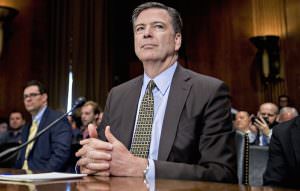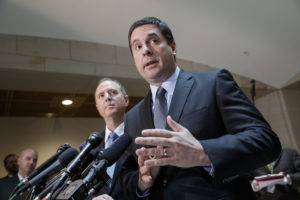The NSA Strikes Back
Just when you thought that momentum in the struggle to rein in the NSA was shifting in the direction of civil liberties, along comes another reminder that momentum is fleeting.
“There’s battle lines being drawn. Nobody’s right if everybody’s wrong.” — Buffalo Springfield, “For What It’s Worth”
Just when you thought that momentum in the struggle to rein in the NSA was shifting in the direction of civil liberties, along comes another reminder that momentum is fleeting and the war is a long way from being won — or lost.
The momentum shift this time comes in the form of an opinion crafted by U.S. District Judge William Pauley dismissing a challenge to the NSA’s telephone metadata collection program brought in New York by the ACLU. Released midday Friday, as a perverse kind of New Year’s gift to the Justice Department, Pauley rejected virtually every argument, statutory and constitutional, raised by the ACLU to block the metadata program.
As such, Pauley’s decision stands in stark contrast to the opinion written only 11 days earlier by District Judge Richard Leon, who sits in Washington, D.C., that found that the program likely violated the Fourth Amendment. Also standing in stark contrast is the fact that Leon was appointed by a Republican president (George H.W. Bush) and Pauley a Democrat (Bill Clinton).
Filed in June after the publication of a classified Foreign Intelligence Surveillance Court order directing Verizon Business Network Services to turn over the phone activity records of its entire customer base to the NSA, the ACLU’s case is one of a handful of metadata lawsuits initiated in the wake of whistle-blower Edward Snowden’s decision to leak a trove of NSA spying materials to journalists Glenn Greenwald, then of The Guardian newspaper, Barton Gellman of The Washington Post and Laura Poitras. The other cases include two legal complaints filed by tea party activist Larry Klayman, which were assigned to Leon; a lawsuit lodged in San Francisco by the Electronic Frontier Foundation, which is scheduled for an important hearing in April; and an unusual petition filed directly with the Supreme Court by the D.C.-based Electronic Privacy Information Center, which was dismissed on procedural grounds without comment in November.
With the EPIC petition effectively quashed by the highest court in the land and the lower courts split on critical legal issues, the three remaining cases will work their way up the appellate ladder, eventually making landfall in the Supreme Court. Although the high court under Chief Justice John Roberts has done its best to dodge decisions on the merits regarding NSA spying –witness last term’s dismissal decision on standing grounds in the case of Clapper v. Amnesty International concerning email surveillance — the court may have no choice but to intervene in the telephone metadata controversy.
When and if the high court gets involved, the justices will be tasked with deciding whether a 1979 Supreme Court case, Smith v. Maryland, governs the NSA’s mass data-mining programs.
In the Smith case, the court held by a margin of 5-3, with the great progressive Justices Thurgood Marshall and William Brennan dissenting and Justice Lewis Powell not taking part, that the government’s installation of a “pen register” device in telecom equipment to record the phone numbers — but not the content — of calls made by a robbery suspect was not a search within the meaning of the Fourth Amendment because telephone users voluntarily surrender that information whenever they place a call. Echoing that rationale, an opinion released by FISA Court Judge Claire V. Eagan in September held that the difference in scale between the NSA’s bulk collection of telecom metadata and the numbers dialed from a single telephone in Smith was constitutionally irrelevant.
In a courageous effort to get around Smith without directly seeming to overrule a Supreme Court precedent, Leon wrote that Smith was a case from the pre-digital era, limited to a single criminal suspect in an investigation that lasted a mere 13 days. The NSA’s metadata program, on the other hand, concerns the cellphone calls placed by millions of innocent Americans in a war on terror of indefinite duration. Leon also brushed aside the administration’s reliance on the secret decisions of the FISA Court like Eagan’s that have validated the metadata program.
Pauley, taking a more conventional approach, not only ruled that Smith remained good law directly applicable to the metadata context, but that the metadata program operated as a “counterpunch” to terrorism that neither threatened nor violated the privacy interests of Americans.
It’s tempting to think that when the dust ultimately settles, the Supreme Court, with its awful record on such constitutional questions as campaign finance (Citizens United) and voting rights (Shelby County v. Holder), will place its stamp of approval on the surveillance state — especially since the chief justice himself appoints the members of the FISA Court that has backed the NSA. Still, as Leon’s ruling proves, the issue of NSA spying makes for strange judicial bedfellows and alliances, unexpected story lines and surprising outcomes. So stay tuned: With public opinion trending squarely against the NSA and the fate of privacy in the modern world hanging in the balance, this legal drama is just getting started.
Your support matters…Independent journalism is under threat and overshadowed by heavily funded mainstream media.
You can help level the playing field. Become a member.
Your tax-deductible contribution keeps us digging beneath the headlines to give you thought-provoking, investigative reporting and analysis that unearths what's really happening- without compromise.
Give today to support our courageous, independent journalists.








You need to be a supporter to comment.
There are currently no responses to this article.
Be the first to respond.